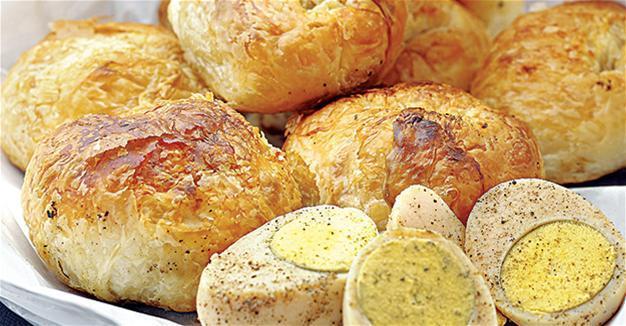İzmir’s Judeo-Spanish pastry boyoz to open up beyond borders
Nazlan Ertan – İZMİR

A band plays lively music on İzmir’s Kıbrıs Şehitleri Street, a smaller version of Istanbul’s İstiklal, in front of the Alsancak Bakery. The line in the bakery seems longer and the conversations somewhat longer as people choose their “boyoz” – a puff pastry that is one of the major gifts of the Sephardic Jews, who came to Turkey more than 500 years ago, to the street food culture of Turkey today.
The city of İzmir is not the only place where the Sephardic Jews, who were exiled from Spain in 1492, carried the tradition of boyoz or, more accurately, “bollos,” which means “small loaves” in Ladino. But the city managed to transfer the bun from the house of Sephardic Jews to the street: Today, men and women on their way to work grab one of these circular buns, oily within its wax paper wrap. More sophisticated versions, boyoz with artichokes, spinach and minced meat readily become a quick lunch. The commercialization of the pastry only occurred in the 1950s, and even then, there were only three bakeries that sold it. As it became more widespread and started to be sold by simit vendors, the delicate pastry, which should ideally be a single dough layer “no thicker than skin,” became thicker and greasier. Boyoz purists would simply refuse to buy one from the streets and insisted that the boyoz should be made by one of the students of Chef Avram, known as the “father” of boyoz-makers in Izmir. Unfortunately, very few of those remain.
The İzmir Trade Chamber is keen to get boyoz, along with İzmir “tulum” cheese, registered geographically as “Boyoz of Izmir,” just like the tiles of İznik, olive oil of Ayvalık or Aegean sultanas.
“We are on the last leg of this process of geographic registration,” said Ekrem Demirtaş, the chairman of the İzmir Chamber of Commerce. “We have applied to the Turkish Patent Institute for this and the decision for geographical registration was published in the Official Gazette on June 3. There is a waiting period of six months and as of the beginning of January 2017, it will become valid,” Demirtaş said.
For Aziz Kocaoğlu, the metropolitan mayor of the city, boyoz is a key brand of the city that needs to be promoted both at home and abroad. During the Boyoz Days, the city’s elite speaks of restaurants in Paris and London that would promote the Aegean delights, but there does not seem to be a concrete action plan. The “Boyoz Days” itself, which started with a major conference at the İzmir Chamber of Commerce and continued with musical bands around town, went unremarked by most residents of the city outside the town center. One of the problems may be that there are too many boyoz festivals over the course of the year and that the idea might have lost its novelty.
“I have not eaten a boyoz in years – it’s too greasy,” said a chic İzmirian as we passed each other as I was heading for one of the main centers of the festival, Dostlar Fırını, loosely translated as “Bakery of Friends.”
The bakery, now run by the founder’s daughter, Berrin Akar Rasuli, has brought new twists to the old recipe by creating boyoz with artichokes or with chocolate. But the old recipe, unfilled and served with an egg that has been cooked for eight hours in an oven of 140 degrees, is energetically recommended by the bakery staff.
“If this is the first-ever boyoz your guest will eat, of course he must start with the classic one,” said the woman at the counter as I tried to get a visitor to try the artichoke boyoz. He loved them both and left with a wistful look, too ashamed to admit that he would like a chocolate one, too.
The Akar family has organized online sales for frozen boyoz around Turkey, as well as nearby countries. Her client base for is mainly from Istanbul, where she had a corporate career before she took up the family business.
“My father, an immigrant from Bulgaria who came to Turkey when he was 13, worked with Jewish bakery chefs and learned to make boyoz as a child. He also worked with Avram Usta himself. Then my father went to Germany as a pastry chef. When he came back to Turkey in 1983, he opened the bakery here in Alsancak, the city’s chic neighborhood. We helped spread it to the whole city – and now beyond,” she said.
 A band plays lively music on İzmir’s Kıbrıs Şehitleri Street, a smaller version of Istanbul’s İstiklal, in front of the Alsancak Bakery. The line in the bakery seems longer and the conversations somewhat longer as people choose their “boyoz” – a puff pastry that is one of the major gifts of the Sephardic Jews, who came to Turkey more than 500 years ago, to the street food culture of Turkey today.
A band plays lively music on İzmir’s Kıbrıs Şehitleri Street, a smaller version of Istanbul’s İstiklal, in front of the Alsancak Bakery. The line in the bakery seems longer and the conversations somewhat longer as people choose their “boyoz” – a puff pastry that is one of the major gifts of the Sephardic Jews, who came to Turkey more than 500 years ago, to the street food culture of Turkey today.